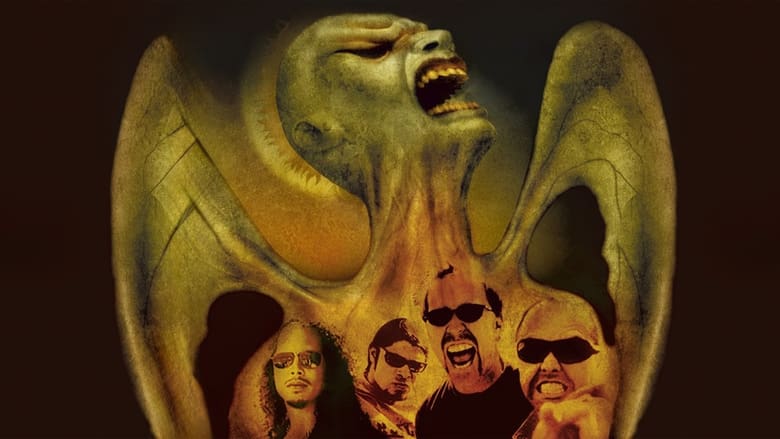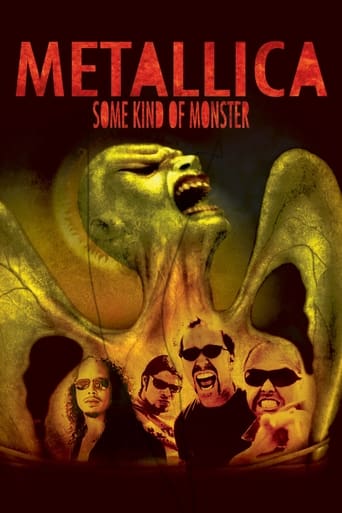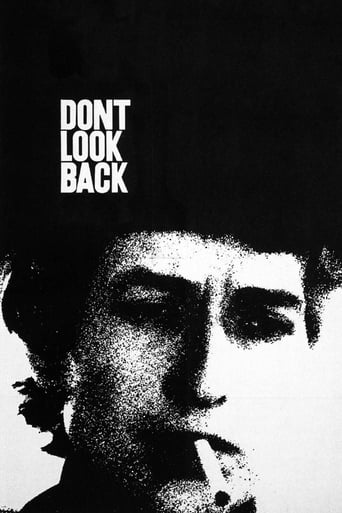Metallica: Some Kind of Monster (2004)
After bassist Jason Newsted quits the band in 2001, heavy metal superstars Metallica realize that they need an intervention. In this revealing documentary, filmmakers follow the three rock stars as they hire a group therapist and grapple with 20 years of repressed anger and aggression. Between searching for a replacement bass player, creating a new album and confronting their personal demons, the band learns to open up in ways they never thought possible.
Watch Trailer
Free Trial Channels
Cast





Similar titles
Reviews
Not even bad in a good way
Great visuals, story delivers no surprises
The performances transcend the film's tropes, grounding it in characters that feel more complete than this subgenre often produces.
The movie runs out of plot and jokes well before the end of a two-hour running time, long for a light comedy.
Based around Metallica's turmoil of the early 2000s, "Some Kind of Monster" offers quite the spectacle for a documentary. After their slew of success through the 80s and 90s, Metallica hit a road block like a lot of bands do. Group in-fighting, fan resentment, people leaving, creative dullness, and that's what this captures. Following the making and release of their polarizing "St. Anger" album, the guys deal with a lot, the death of Cliff, Jason leaving for his side project, James going to rehab, the Napster fall out, and even each others egos. It never paints Metallica as this perfect entity, who's only problem is being too famous. It doesn't even go into how polarizing the album was, how it's considered by many to be their worst work, but this isn't about that, it's about their journey towards wholeness. Critiquing music in general is super subjective anyway, more so than film or video games, so I'm honestly glad they didn't focus on that aspect. I haven't actually heard "St. Anger" front to back, only a couple songs, but it's about people working through the problems they have, through the only medium that brings them together. I don't see what's so bad about that. As a Metallica fan through and through, this is a great gift, a great warts and all documentary about how hard it is to do what you love.
Some Kind of Monster is a wonderful look into a band that is gradually falling apart. To be quite honest though, it was nowhere near as bad as I had been led to believe. Sure there are some spats between band mates, but it never got to violent excess. In fact, all it did show was their passion as each one believed in what was right for the music. At one point Lars even agrees, when discussing the naming of the album, as he didn't see Frantic as having any negative connotations. This shows a band where a member has just left and another is battling addiction. Of course there are going to be some arguments. I felt that above all this showed a band of 20 years continuing to mature. There are some very emotional moments, such as the scene with Dave Mustaine, as he talks about feeling betrayed and number 2 for all these years. The chemistry between Hetfield and Ulrich is that of a married couple prone to arguing, but you can still feel the love. As for Hammett, he is their awkward child stuck in the middle hoping it's all gonna be alright. A great film about music, business, passion, and ego.
The definitive account of a heavy metal band in full self-destruct mode is, of course, 'This is Spinal Tap', a spoof that feels as true as it does absurd. And the prospect of a documentary about a crisis in real-life band Metallica brings hopes of something similar. But the truth revealed by this long documentary is as dull as it is surprising: that the band, far from being ageing wild men, are middle-aged businessmen deep into a culture of therapy; As someone who is not a fan of the music, it's interesting to see how singer James Hefield is clearly a man of considerable vocal talents, and not just a wild screamer; but when he tells you he drives a roadster to indicate that he's a rebel, he could be any forty-something desperate to convince himself of this fact. In the middle of the film, he checks into rehab to help recover from alcoholism, which is potentially a powerful story. But on camera, we never see him drink a drop, and only get to witness the endless, self-absorbed discussions and ego-trading with his fellow band members that seem indicative of a group that lacks the urgency, need or desire to actually achieve anything beyond bickering about their places in the group's internal pecking order. The film's only value comes in exposing this; for if this is truly rock and roll, then rock and roll is dead.
This film has far too much group therapy and not nearly enough music. The issues expressed in the therapy sessions are banal; important to the participants, but not interesting to an outsider. You get no sense of why Metallica was so important to so many people. It is hard to believe that they would allow a film crew to record them in such an unfavorable light. The thing that leaped out about Metallica's music was always the furious, dark, angry energy. Hearing Lars complain about James being late to practice is not that exciting.And visually, they don't look so good up close anymore. Pushing 40, gaining weight, losing hair, with wives and children -- they even say it themselves: it's not rock'n'roll.Part of the fun of idolizing a band is that you think that the people are somehow different or special. That is a fantasy, of course, but it is an important part of being a fan. The film reduces the musicians back to just normal whiny folks.The therapist is obviously eager for the spotlight. It was unethical of him to agree to the filming of the group therapy, even though the participants agreed. When a camera crew is present, people speak and act differently than if no camera crew was there.There is some talk of money that you don't normally hear. Lars offered Rob Trujillo $1,000,000 as an advance when he joined the band. There is a discussion of voting rights based on percentages based on length of service. The therapist got $40,000 per month.












